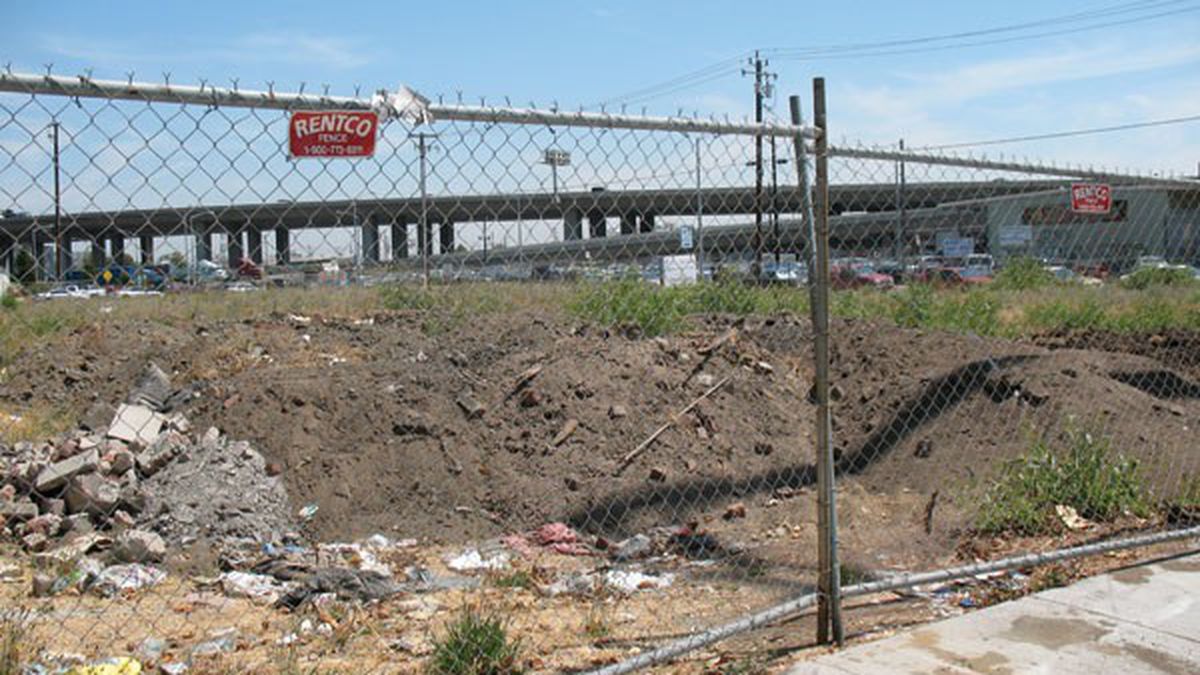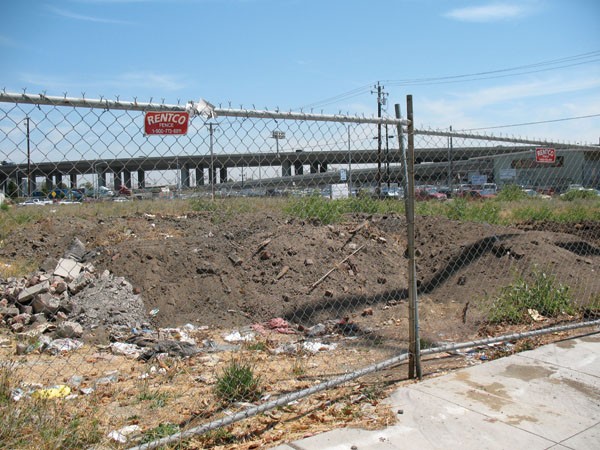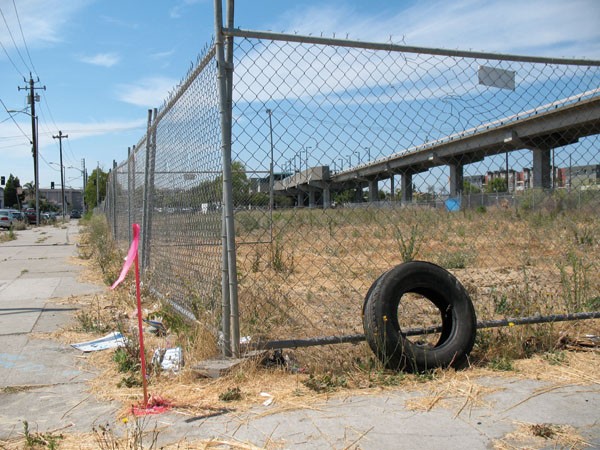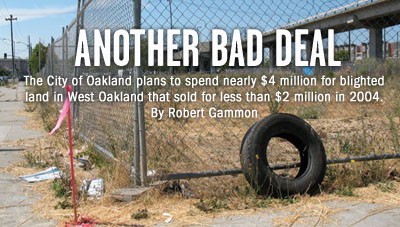Why is the City of Oakland once again planning to spend a bunch of money on blighted property during one of the worst real estate downturns in history? That’s just one of the questions swirling around a proposal for the city to use $3.9 million in taxpayer funds to purchase a small, weed-strewn strip of land in West Oakland that sold for $1.89 million just four years ago.
But there are far more troubling aspects to this deal than possibly overpaying for property that may require costly environmental remediation. At the center of the deal is a politically connected local businessman, Jabari Herbert, who failed to disclose his financial interest in the property when urging city councilmembers to go forward with the purchase last month.
This questionable deal involves slightly less than one acre of land at 1396 5th Street, between Mandela Parkway and Kirkham Street, directly across from the West Oakland BART station. For decades, the property was home to the Red Star Yeast manufacturing plant, which closed in 2003 and was torn down after years of neighborhood complaints about foul smells wafting over the area. In December 2004, a group of investors led by Herbert and local developer Curtis Eisenberger purchased the property for $1.89 million.
Eisenberger and Herbert planned to transform the land into a market-rate condominium complex, with some commercial space. They obtained city approvals to build 119 condos — in part because their plan matched the desires of neighborhood activists and city officials who have sought for years to the turn the area immediately surrounding the West Oakland BART station into a thriving transit village.
By the summer of 2006 Eisenberger and Herbert had obtained financing for their development and were preparing to break ground when they discovered a buried fuel tank on the property, according to public records. Eisenberger told Full Disclosure that their plans soon started to unravel. “By the time we got that tank pulled out, the market had changed, and our lender pulled out, and then the market really changed,” he said.
With the threat of foreclosure hanging over them, the developers filed for Chapter 11 bankruptcy. Federal court records, however, reveal that there were more problems than the underground fuel tank and a bad real estate market. Eisenberger disclosed in bankruptcy court that his environmental consultant also had discovered a mercury spill on the property in the mid-1990s. The spill supposedly had been cleaned up, but Eisenberger said in court records that the California Department of Health Services refused to sign off on the condo plans because there was no documented proof that the clean-up actually occurred.
Eisenberger told the bankruptcy court that his company’s total debts on the project had ballooned to $3 million. His company hoped to pay off those creditors by selling the property for $3.9 million, he indicated last year in court documents. But after the land sat on the market for months without any serious buyers coming forward, a sale at that price looked like wishful thinking. Then, a few months ago, a Southern California developer offered to buy the property to build condos for senior citizens, Eisenberger said in an interview.
When neighborhood activists learned of the proposed deal, however, they immediately tried to kill it. They prefer market-rate housing over affordable senior housing because they believe the former fits better with their plans for the area. “It’s problematic for those of us who want to see the transit village,” Steve Lowe, a respected West Oakland activist and businessman, said of the senior housing proposal. Lowe also is a member of the West Oakland Project Area Committee, a city-sanctioned group that advises local officials on West Oakland projects and proposals. In June of this year, that committee voted to ask the city to buy the property for $3.9 million to stop the senior housing from going forward.
However, no one apparently disclosed to city leaders that one of the property owners, Herbert, also is a member of the West Oakland committee. Lowe said he couldn’t remember whether Herbert — whose company would be saved from bankruptcy if the city purchased the property — had recused himself from the committee’s vote.
Regardless of whether Herbert participated in the committee’s vote, or even disclosed his conflict of interest to the rest of the committee, he misrepresented himself at a city council committee meeting last month. At the July 22 meeting, Herbert described himself as a concerned citizen and a representative from the West Oakland city-sanctioned committee, while attempting to convince the council to go forward with the property purchase. He did not, however, reveal his ownership in the property. The failure to disclose was key because councilmembers historically have given great weight to advice given by such committees. After Herbert’s testimony, the council committee voted unanimously to send the proposed purchase to the full council for approval next month. Under the deal, the city’s redevelopment agency would buy the land outright and then look for another developer to buy it from the city and build market-rate housing.
In a brief phone conversation with Full Disclosure, Herbert said he would call back to answer questions, but then never did. Yet, before he hung up, he claimed he was no longer an owner of the property. However, that statement was previously contradicted by his business partner, Eisenberger, who said Herbert still had a financial stake in the company that owns the property. In fact, according to current bankruptcy records, Herbert’s company Fifth Street and Mandela LLC owns more shares in the company that owns the property than does Eisenberger’s company, Mariposa Property Inc.
In addition, it’s not entirely clear how serious the senior housing proposal really is. When reached by phone, Darren Berberian of National Affordable Communities, the Southern California developer, said his company was “very interested” in buying the property and “we’re preparing to close on it.” But Berberian said he could not remember the closing date. He promised to call back to answer more questions and then never did. So is the senior housing proposal credible? That’s not at all clear either. According to public records, someone appears to have misled state officials earlier this year when Berberian applied for $2 million in tax credits from the California Tax Credit Allocation Committee for the planned West Oakland senior facility. State paperwork that appears to have originated from Berberian stated that the City of Oakland “strongly supports” his project. In truth, the city appears to have no interest in senior housing at that site.
So why would Eisenberger and Herbert want the city to purchase their property when they already have a buyer lined up? Eisenberger acknowledged that one of the reasons was that he wanted to make sure he had a backup buyer for his land if the offer for the senior housing deal falls through.
The proposal is being pushed by the city’s deputy director of economic development and redevelopment Gregory Hunter, who did not return two phone calls seeking comment for this story. Hunter’s office is behind another questionable deal described on these pages in June (see “Profiting from Redevelopment,” June 18). In that deal, the city planned to buy a run-down piece of property in East Oakland for $1.45 million even though it sold for just $380,000 last fall.
The city council later reexamined that proposal, and let’s hope that it takes a hard look at this flawed deal too. It makes little financial sense for the city to spend $3.9 million for blighted, possibly toxic land on the slim hope that it could find a developer who will fully reimburse the city for the right to build market-rate housing in a borderline neighborhood during a severe housing downturn. The senior housing proposal may not be ideal, but it’s apparently market-driven. It’s also far better right now for private investors to take financial risks on questionable housing development than for the city do it with taxpayer money.
At the very least, if the senior housing deal falls apart, then the city should demand that Eisenberger and Herbert dramatically lower their asking price, and that Herbert start disclosing the truth about his financial stake in the property. The city should not be in the business of overpaying for property or using taxpayer money to bail out businessmen who’ve gone bankrupt because of the collapse in housing. To do so would be patently unfair at a time when hundreds, if not thousands, of hardworking Oaklanders have lost their homes because of the foreclosure crisis without coming to City Hall looking for a handout.
Will Perata Be Indicted?
That’s the question on the minds of politicos in both Oakland and Sacramento. As readers of these pages know, the Express reported last month that sources said they expected state Senate President Pro Tem Don Perata to be indicted soon on federal corruption charges. Whether that would be a few weeks or months wasn’t clear.
Perata’s spokesman Jason Kinney subsequently asserted that this newspaper’s sources were wrong, and it’s now obvious that “soon” was not a matter of weeks. But does that mean the Oakland Democrat will not be indicted at all, as Kinney contends? Not according to the Wall Street Journal, which reported earlier this month that sources expected Perata to be indicted “within the next month or two.”
Here’s the exact quote from the Journal: “Prosecutors have indicated to defense lawyers that they’re close to wrapping up their probe, said people close to the defense, who added that they expect Mr. Perata to be indicted within the next month or two.”
The Perata camp and some Congressional Democrats have complained that the recent flurry of stories about a possible upcoming indictment allegedly were generated by government leaks. But the Journal story clearly stated that it was based on sources “close to the defense” — in other words, people close to Perata’s attorneys or to the lawyers of his friends, colleagues, and family members also caught up in the wide-ranging federal probe.
The Journal also reported that the defense team is trying to put off the indictment until later this fall: “The defense has lobbied prosecutors to delay any charges until after the state budget is finished and after the November presidential election, said people close to the defense.”
















